What is a Fingerprint Background Check for Employment?
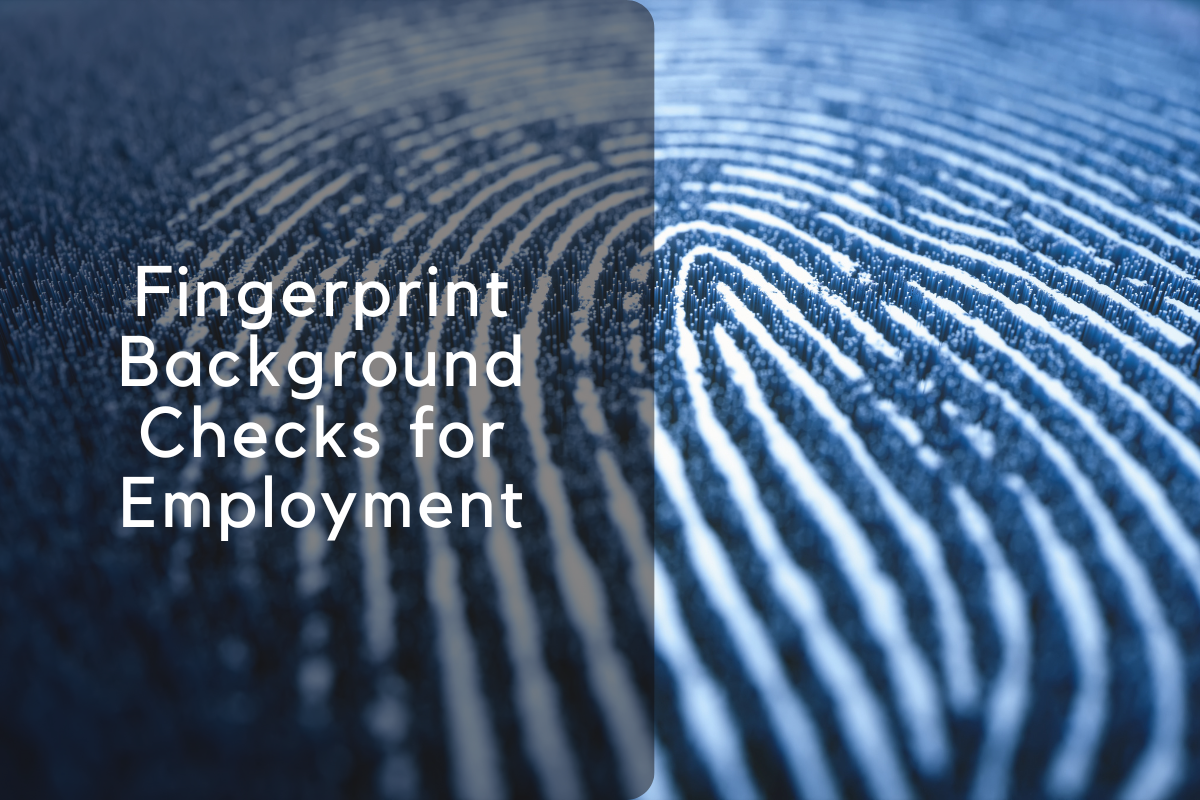
A fingerprint background check for employment is a process in which an individual’s fingerprints are captured and submitted to the relevant authorities, such as the FBI or state police, to check for any criminal history. Unlike traditional background checks, which typically rely on personal details like names and dates of birth, fingerprint background checks provide a higher level of accuracy. The process uses biometric data (fingerprints) to uniquely identify individuals and cross-reference criminal records stored in national and state databases.
Why Employers Require Fingerprint Background Checks
Employers require fingerprint background checks to ensure that potential employees are trustworthy, have no hidden criminal records, and are suitable for the roles they’re applying for. This is particularly important in industries where safety, security, and sensitive information handling are crucial. In fields like healthcare, law enforcement, childcare, and education, a fingerprint background check helps employers verify that applicants don’t have a history of criminal behavior that would pose a risk in their workplace.
The Difference Between a Standard Background Check and a Fingerprint-Based Check

A standard background check typically involves a review of public records, such as criminal history, financial status, and employment history. It relies on personal information like name, date of birth, and address. While effective, it can sometimes lead to errors or misidentification because people may share common names or dates of birth.
In contrast, a fingerprint-based background check uses biometric data—fingerprints—that are unique to each individual. This makes it significantly more accurate and helps reduce the likelihood of identity fraud or mistakes. Fingerprints are submitted to databases maintained by law enforcement agencies like the FBI and state police, which are specifically designed to store and identify criminal records based on fingerprint data.
The Fingerprint Background Check Process
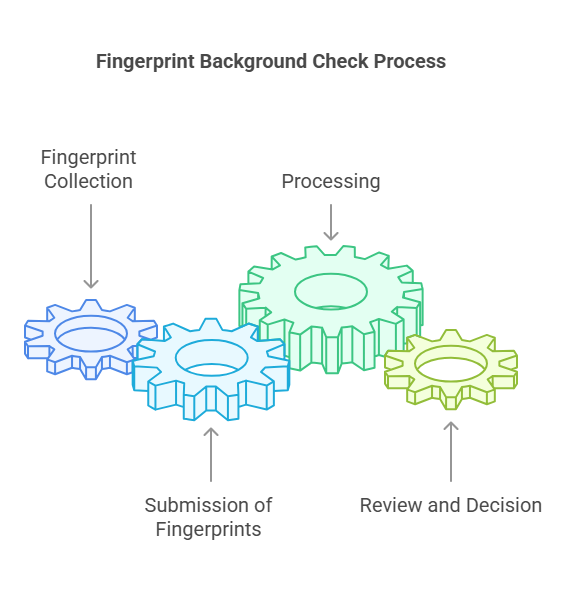
The fingerprint background check process typically involves the following steps:
- Fingerprint Collection: Applicants are required to provide their fingerprints, which can be collected digitally using a Live Scan machine or traditionally with ink. Most employers use Live Scan technology, which is faster and more accurate than the traditional ink method.
- Submission of Fingerprints: Once the fingerprints are collected, they are submitted to the relevant agency—either state law enforcement or the FBI—for processing and comparison with criminal records databases.
- Processing: The agency processes the fingerprints and checks for any matches in their criminal records. The results are typically sent back to the employer or the designated background check service provider.
- Review and Decision: Employers review the results and make hiring decisions based on the information obtained. If criminal activity is found, the employer will determine if it is relevant to the position.
Industries That Use Fingerprint Background Checks
Fingerprint background checks are commonly used in industries where employees have access to vulnerable populations, sensitive data, or where security is critical. These include:
- Healthcare: Hospitals and clinics require fingerprint checks for doctors, nurses, and other staff working with patients to ensure that employees do not have a history of criminal activity.
- Education: Teachers, administrators, and daycare workers often undergo fingerprint checks to ensure the safety of children and students.
- Law Enforcement and Security: Employees in law enforcement, security agencies, and private security firms are subject to fingerprint-based checks to maintain integrity and public trust.
- Financial Services: Banks and financial institutions use fingerprint checks to avoid hiring individuals with a history of fraud or financial crimes.
The Process, Benefits, and Challenges of Fingerprint Background Checks
Step-by-Step Guide to Conducting a Fingerprint Background Check
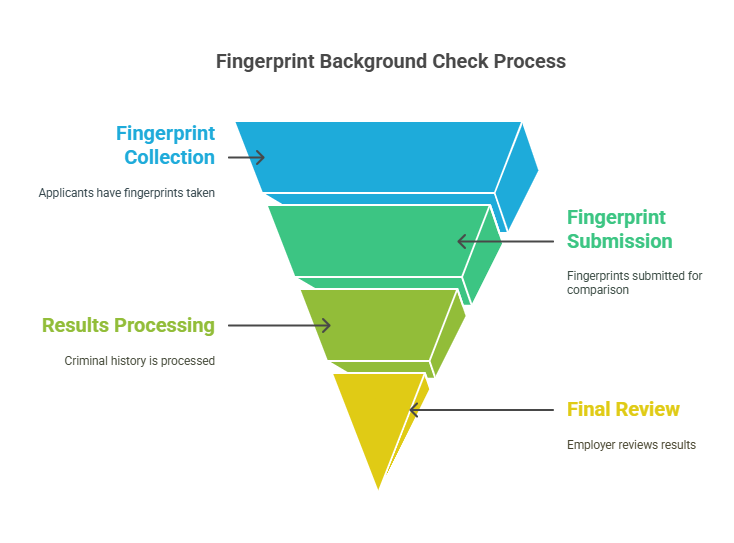
- Initiation by Employer: The employer initiates the fingerprint background check by providing instructions on where and how the applicant can have their fingerprints taken.
- Fingerprint Collection: Applicants visit a designated facility to have their fingerprints taken. In many cases, this will be through a Live Scan service, where fingerprints are scanned electronically.
- Fingerprint Submission: The collected fingerprints are submitted either through an agency or directly to the FBI or state law enforcement for comparison against criminal databases.
- Background Check Results: After processing, the background check results, which include any criminal history, are returned to the employer.
- Final Review: Employers review the results, considering the severity and relevance of any criminal activity, to make an informed decision.
The Benefits of Fingerprint Background Checks for Employers
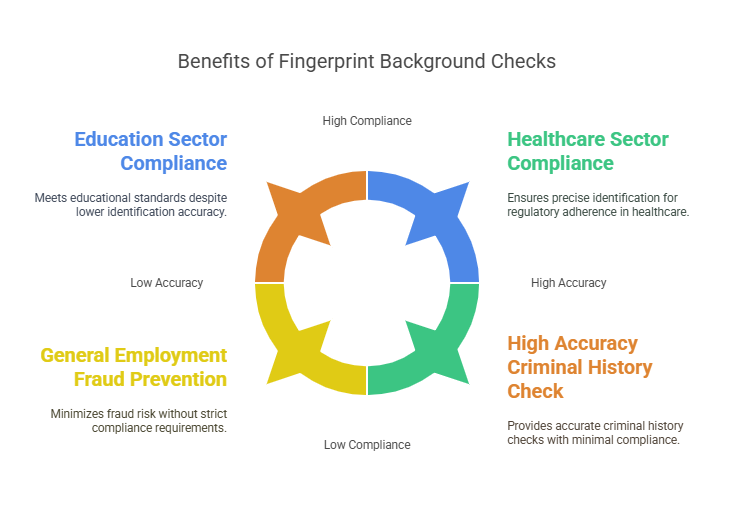
Fingerprint background checks offer several advantages for employers, including:
- Accuracy: Since fingerprints are unique to each individual, they provide the most accurate method of identifying criminal history.
- Reduced Fraud: Fingerprint checks reduce the likelihood of identity theft or false claims, as they are based on biometric data.
- Compliance: Many industries, especially healthcare and education, require fingerprint background checks for compliance with state and federal regulations. Using this method helps employers avoid potential legal issues.
- Prevention of Hiring Risks: Employers can avoid hiring individuals who may pose a risk to their business or clientele, thus enhancing workplace safety and security.
Common Challenges of Fingerprint Background Checks
While fingerprint background checks are highly effective, they are not without their challenges. These include:
- Fingerprint Quality: Sometimes, the fingerprints collected may not be of sufficient quality, leading to delays in processing or inaccuracies in identification.
- Processing Delays: Although fingerprint checks are typically faster than traditional background checks, delays in processing by law enforcement agencies can slow down the hiring process.
- Cost: The cost of fingerprint background checks can vary depending on the location and method used (Live Scan vs. ink). This may be an added expense for employers.
- Discrepancies or Errors: While rare, fingerprint matches can sometimes be inaccurate, especially in cases of poor-quality prints. Applicants may need to have their prints re-submitted, leading to additional delays.
Types of Offenses That Can Appear on a Fingerprint Background Check
Fingerprint background checks can reveal a range of criminal activities. Here’s a list of potential offenses that could show up:
| Offense Type | Possible Consequences |
|---|---|
| Felonies | Disqualifies candidates from certain roles in education, healthcare, and law enforcement. |
| Misdemeanors | May result in disqualification for some employers but is less severe than felonies. |
| Sexual Offenses | Often disqualifies individuals from positions working with children or vulnerable populations. |
| Drug Offenses | May be a barrier for employment in healthcare or roles requiring security clearance. |
| Theft/Fraud | Could disqualify applicants for positions in financial services, banking, or security. |
How Rapid Hire Solutions Can Help Employers Streamline Fingerprint Background Checks
Rapid Hire Solutions provides efficient and reliable fingerprint background check services. Our platform helps employers navigate the complexities of fingerprint background checks, ensuring compliance with both state and federal regulations. Our services simplify the process, helping you secure accurate results quickly, while offering guidance to avoid common challenges such as fingerprint quality or misidentification.
How Applicants Can Prepare for a Fingerprint Background Check
To ensure a smooth fingerprint background check process, applicants should:
- Ensure Clear Fingerprints: Clean hands and proper fingerprinting techniques help avoid poor-quality prints.
- Bring the Right Documents: Applicants should bring identification documents such as a driver’s license or passport as required by the employer.
- Be Prepared for Delays: Depending on the volume of requests or database matches, fingerprint checks may take several days to process.
Legal Framework for Fingerprint Background Checks
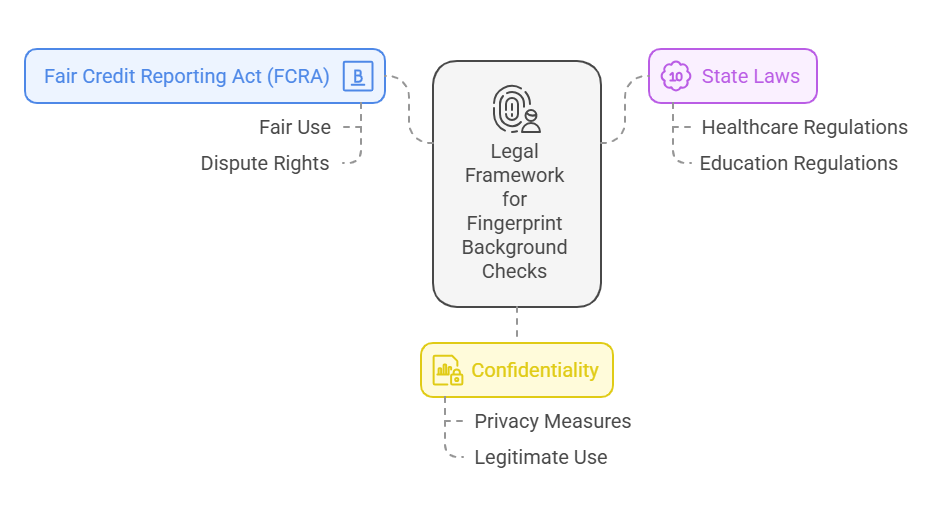
There are several legal considerations employers must keep in mind when conducting fingerprint background checks for employment:
- Fair Credit Reporting Act (FCRA): The FCRA ensures that employers use background check information in a fair and non-discriminatory manner. It also gives applicants the right to dispute any inaccurate information on their reports.
- State Laws: Some states have additional regulations surrounding fingerprint background checks, especially in industries like healthcare and education.
- Confidentiality: Employers must ensure that any criminal history obtained through a fingerprint background check is kept confidential and used only for legitimate hiring decisions.
Frequently Asked Questions
How long does a fingerprint background check take to complete?
Typically, fingerprint background checks can take anywhere from 24 hours to several days depending on the processing time by the agency.
What types of criminal records show up on a fingerprint background check?
Fingerprint background checks can reveal felonies, misdemeanors, sex offenses, theft, fraud, and other criminal activities.
Are there any laws that prevent employers from hiring someone based on a fingerprint background check?
Yes, employers must comply with anti-discrimination laws, including those that prohibit hiring decisions based solely on criminal history, especially for positions unrelated to the offense.
How accurate are fingerprint background checks compared to other types of background checks?
Fingerprint checks are much more accurate than name-based background checks, as they are based on unique biometric data.
Can an applicant dispute the results of a fingerprint background check?
Yes, applicants can dispute any errors or discrepancies found during the fingerprint background check process.
Conclusion
Fingerprint background checks for employment provide employers with the most reliable method to verify the criminal history of potential hires. By ensuring greater accuracy, reducing the risk of fraud, and helping employers comply with industry standards, fingerprint checks are an essential tool in the hiring process. Rapid Hire Solutions simplifies the process, helping employers conduct compliant, efficient, and effective fingerprint background checks.
For employers seeking to ensure accurate and timely results in their hiring processes, Rapid Hire Solutions is here to assist every step of the way.
